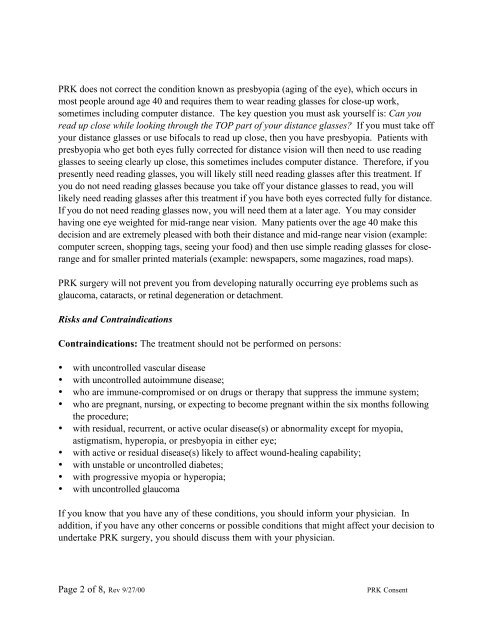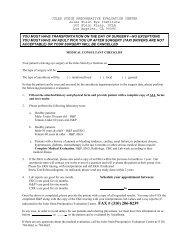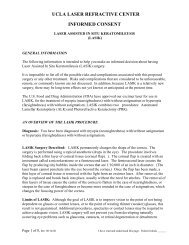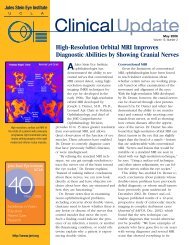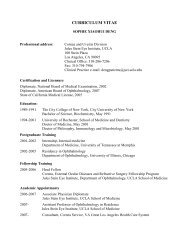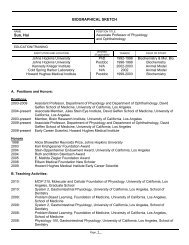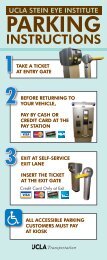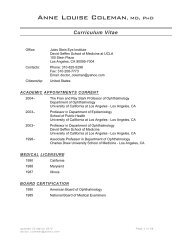Kevin M. Miller, MD INFORMED CONSENT
Kevin M. Miller, MD INFORMED CONSENT
Kevin M. Miller, MD INFORMED CONSENT
You also want an ePaper? Increase the reach of your titles
YUMPU automatically turns print PDFs into web optimized ePapers that Google loves.
PRK does not correct the condition known as presbyopia (aging of the eye), which occurs in<br />
most people around age 40 and requires them to wear reading glasses for close-up work,<br />
sometimes including computer distance. The key question you must ask yourself is: Can you<br />
read up close while looking through the TOP part of your distance glasses? If you must take off<br />
your distance glasses or use bifocals to read up close, then you have presbyopia. Patients with<br />
presbyopia who get both eyes fully corrected for distance vision will then need to use reading<br />
glasses to seeing clearly up close, this sometimes includes computer distance. Therefore, if you<br />
presently need reading glasses, you will likely still need reading glasses after this treatment. If<br />
you do not need reading glasses because you take off your distance glasses to read, you will<br />
likely need reading glasses after this treatment if you have both eyes corrected fully for distance.<br />
If you do not need reading glasses now, you will need them at a later age. You may consider<br />
having one eye weighted for mid-range near vision. Many patients over the age 40 make this<br />
decision and are extremely pleased with both their distance and mid-range near vision (example:<br />
computer screen, shopping tags, seeing your food) and then use simple reading glasses for closerange<br />
and for smaller printed materials (example: newspapers, some magazines, road maps).<br />
PRK surgery will not prevent you from developing naturally occurring eye problems such as<br />
glaucoma, cataracts, or retinal degeneration or detachment.<br />
Risks and Contraindications<br />
Contraindications: The treatment should not be performed on persons:<br />
• with uncontrolled vascular disease<br />
• with uncontrolled autoimmune disease;<br />
• who are immune-compromised or on drugs or therapy that suppress the immune system;<br />
• who are pregnant, nursing, or expecting to become pregnant within the six months following<br />
the procedure;<br />
• with residual, recurrent, or active ocular disease(s) or abnormality except for myopia,<br />
astigmatism, hyperopia, or presbyopia in either eye;<br />
• with active or residual disease(s) likely to affect wound-healing capability;<br />
• with unstable or uncontrolled diabetes;<br />
• with progressive myopia or hyperopia;<br />
• with uncontrolled glaucoma<br />
If you know that you have any of these conditions, you should inform your physician. In<br />
addition, if you have any other concerns or possible conditions that might affect your decision to<br />
undertake PRK surgery, you should discuss them with your physician.<br />
Page 2 of 8, Rev 9/27/00 PRK Consent


